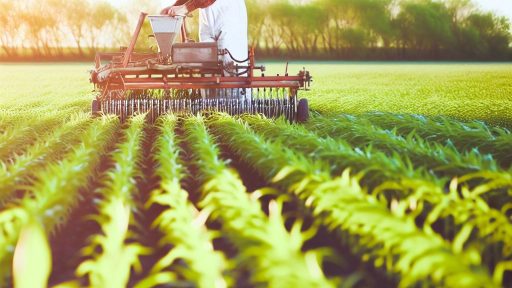Introduction to Conservation Programs in Organic Farming
Conservation programs play a vital role in supporting organic farming practices.
These programs promote sustainable agricultural methods.
Farmers benefit significantly from financial and technical assistance.
Moreover, these initiatives encourage environmental stewardship.
They prioritize practices that enhance soil quality and biodiversity.
Importance of Conservation in Organic Agriculture
Conservation efforts reduce the environmental impact of farming.
They help mitigate climate change effects through carbon sequestration.
Additionally, these practices enhance water conservation strategies.
Farmers adopting conservation methods often see improved yields.
Types of Conservation Programs
Various programs exist to support organic farming initiatives.
One example is the Environmental Quality Incentives Program (EQIP).
This program offers cost-sharing for implementing conservation practices.
Another significant program is the Conservation Stewardship Program (CSP).
CSP rewards farmers for maintaining and enhancing conservation practices.
Engagement and Training Opportunities
Many organizations provide training for farmers in organic practices.
Transform Your Agribusiness
Unlock your farm's potential with expert advice tailored to your needs. Get actionable steps that drive real results.
Get StartedWorkshops and field days demonstrate effective methods.
Farmers also have access to personalized conservation plans.
These resources ensure successful implementation of practices.
Success Stories from the Field
Many farmers have transformed their practices through these programs.
For instance, Sarah Green of Green Acres Farm increased her soil health.
Using cover crops, she improved soil structure and nutrient content.
Similarly, Mike Johnson from Sunrise Hills Farm enhanced his water management.
His efforts led to better irrigation efficiency and reduced runoff.
Overview of Organic Farming Practices and Their Environmental Benefits
Defining Organic Farming
Organic farming focuses on sustainable agricultural practices.
Farmers avoid synthetic chemicals in their methods.
They utilize natural fertilizers and pesticides instead.
This approach enhances soil health and fertility.
Key Practices in Organic Farming
Crop rotation is a fundamental practice in organic farming.
This technique prevents soil depletion and improves biodiversity.
Additionally, cover cropping protects soil from erosion.
It also encourages healthy microbial activity in the soil.
Integrating livestock into farming further promotes sustainability.
Animals contribute to nutrient cycling and pest control.
Environmental Benefits of Organic Farming
Organic farming significantly lowers chemical runoff.
This reduction enhances nearby water quality.
It also supports wildlife habitats by avoiding pesticides.
Moreover, organic practices combat climate change.
They promote carbon sequestration through healthy soil.
Impacts on Biodiversity
Organic farms tend to host greater biodiversity.
Showcase Your Farming Business
Publish your professional farming services profile on our blog for a one-time fee of $200 and reach a dedicated audience of farmers and agribusiness owners.
Publish Your ProfileThis diversity includes various plant and animal species.
Healthier ecosystems are a direct result of organic methods.
Consequently, these systems become more resilient to pests.
Social and Economic Benefits
Organic farming boosts local economies through niche markets.
Consumers increasingly demand organic products, driving sales.
Additionally, organic farms create job opportunities in rural areas.
These jobs focus on sustainable practices and community welfare.
Major Conservation Programs Supporting Organic Farming
Understanding Conservation Programs
Conservation programs provide essential support for organic farming practices.
They promote sustainable agricultural methods and protect natural resources.
Farmers benefit from these programs through incentives and technical assistance.
Key Programs for Organic Farmers
Several key programs specifically support organic farming initiatives.
The Environmental Quality Incentives Program (EQIP) is one of them.
It offers financial assistance for implementing conservation practices.
Additionally, the Conservation Stewardship Program (CSP) rewards farmers for maintaining sustainable practices.
These programs often prioritize practices that enhance soil health and biodiversity.
Funding Opportunities
Funding is crucial for the success of conservation programs.
Many programs offer grants to support farmers transitioning to organic practices.
The National Organic Program (NOP) provides certification assistance for organic producers.
Furthermore, state-level programs often complement federal initiatives.
Technical Assistance
Technical assistance is another vital component of conservation programs.
Experts help farmers design and implement effective conservation plans.
Workshops and training sessions are available for skills development.
Farmers can learn about practices like crop rotation and cover cropping.
These techniques improve soil fertility and reduce erosion.
Success Stories
Many farmers have successfully utilized these conservation programs.
Susan Mitchell, a corn farmer in Iowa, improved her yield and soil quality.
She adopted cover crops and reduced chemical inputs through program guidance.
Another example is the Johnson Family Farm in Vermont.
Through EQIP, they enhanced their agroforestry systems, promoting biodiversity.
Challenges Faced
Despite the benefits, farmers face challenges in accessing these programs.
Complex application processes can deter potential participants.
Moreover, inadequate funding limits the number of farmers supported.
Efforts are underway to streamline applications and increase funding availability.
Future Directions in Conservation for Organic Farming
As organic farming grows, conservation programs will evolve.
Future programs may emphasize climate resilience and carbon sequestration.
Innovation in sustainable practices will continue to drive program development.
Collaboration between farmers and conservation agencies is essential.
Discover More: Key Animal Welfare Laws Every Farmer Should Know
The Role of Government Agencies in Promoting Organic Conservation Practices
Introduction to Government Involvement
Government agencies play a crucial role in promoting organic farming practices.
They create programs that support sustainability and environmental conservation.
Showcase Your Farming Business
Publish your professional farming services profile on our blog for a one-time fee of $200 and reach a dedicated audience of farmers and agribusiness owners.
Publish Your ProfileAdditionally, these agencies provide financial assistance to farmers transitioning to organic methods.
Development of Conservation Programs
Government agencies develop various conservation programs to aid organic farmers.
For instance, the Natural Resources Conservation Service (NRCS) offers technical aid.
This service helps farmers adopt conservation practices that benefit both their land and products.
- Soil health improvement initiatives
- Water conservation strategies
- Biodiversity enhancement projects
Financial Incentives and Support
Many government programs offer financial incentives for organic farming.
For example, the Environmental Quality Incentives Program (EQIP) provides funds for implementing conservation practices.
Additionally, grants and subsidies can help offset the costs of organic certification.
Educational Resources for Farmers
Government agencies also provide educational resources to farmers.
They host workshops and training sessions on organic practices.
Farmers gain valuable knowledge on pest management and soil fertility through these programs.
Collaboration with Local Entities
Collaboration between government agencies and local organizations enhances program success.
Local extensions work alongside agencies to promote conservation efforts effectively.
This cooperation helps tailor programs to meet regional farming needs.
Measuring Success and Impact
Government agencies regularly assess the impact of conservation programs.
They measure progress through sustainability metrics and environmental outcomes.
These assessments guide future program developments and adaptations.
Delve into the Subject: Emission Standards for Modern Farms
Case Studies of Successful Conservation Programs in Organic Farming
Introduction to Conservation Programs
Conservation programs play a vital role in supporting organic farming practices.
They promote sustainable agriculture while protecting natural resources.
These programs often involve collaboration between farmers, organizations, and government agencies.
As a result, they create a positive impact on the environment and local communities.
Program Example: The Conservation Stewardship Program
The Conservation Stewardship Program (CSP) encourages farmers to adopt conservation practices.
This program offers financial incentives for implementing sustainable methods.
For instance, it supports crop rotation and cover cropping.
Farmers like Emily Parker have benefited greatly from CSP.
She increased her yields while improving soil health on her farm.
Program Example: The Environmental Quality Incentives Program
The Environmental Quality Incentives Program (EQIP) focuses on unique conservation solutions.
This program provides technical and financial assistance to organic farmers.
Farmers can use these resources to implement practices like precision agriculture.
Moreover, they can improve water quality through better nutrient management.
Jordan Reyes, an EQIP participant, successfully reduced his farm’s runoff.
Collaborative Efforts: Land Trusts and Nonprofits
Nonprofit organizations and land trusts also contribute to conservation in organic farming.
These partnerships often focus on land preservation and restoration projects.
For instance, the Green Earth Initiative works with local farmers to enhance biodiversity.
Through education and resources, they promote organic farming practices.
This collaboration fosters community involvement and strengthens local ecosystems.
Case Study: The Organic Farming Research Foundation
The Organic Farming Research Foundation (OFRF) supports innovative research in organic practices.
They provide grants and funding for projects that improve organic farming techniques.
Recent studies funded by OFRF focus on soil health and pest management strategies.
Additionally, they mentor farmers in adopting new technologies.
Showcase Your Farming Business
Publish your professional farming services profile on our blog for a one-time fee of $200 and reach a dedicated audience of farmers and agribusiness owners.
Publish Your ProfileThis guidance helps farmers increase productivity while maintaining sustainability.
Impact on Local Communities
Conservation programs lead to numerous benefits for local communities.
They enhance food security by promoting sustainable agriculture.
Moreover, these programs create job opportunities and boost local economies.
As farmers adopt organic practices, they contribute to the community’s health.
These initiatives foster resilience and sustainability for future generations.
You Might Also Like: Navigating Pesticide Use Laws

Funding Opportunities for Organic Farmers Through Conservation Programs
Introduction to Conservation Programs
Conservation programs play a vital role in supporting organic farming practices.
These programs offer essential financial assistance to farmers committed to sustainable methods.
By focusing on eco-friendly techniques, farmers can preserve soil health and biodiversity.
Types of Conservation Programs
Several programs are available for organic farmers looking for funding opportunities.
The Environmental Quality Incentives Program (EQIP) is a popular choice.
Additionally, the Conservation Stewardship Program (CSP) supports environmental enhancement practices.
Moreover, the Agricultural Conservation Easement Program (ACEP) aids in conserving agricultural land.
Eligibility Criteria for Programs
Eligibility varies across different conservation programs.
Farmers must meet specific criteria to qualify for funding.
Generally, applicants must have an existing organic system plan.
Furthermore, they must demonstrate the potential environmental benefits of their proposed practices.
Application Process
Applying for funding involves multiple steps, each requiring careful attention.
First, farmers must gather necessary documentation for their applications.
Next, they should consult their local USDA service center for guidance.
Finally, submitting a complete and accurate application is crucial for success.
Benefits of Participating in Conservation Programs
Engaging in conservation programs offers numerous advantages to organic farmers.
Farmers receive financial support for implementing sustainable practices.
Additionally, participation enhances their credibility within the market.
Moreover, farms can improve their ecological impact and community reputation.
Success Stories
Many farmers have experienced positive outcomes through conservation program participation.
For instance, Maria Thompson, an organic apple farmer, successfully transformed her land.
She used EQIP funding to install beneficial cover crops and erosion control measures.
As a result, her yields and soil health significantly improved.
Resources for Further Assistance
Various resources are available to help farmers navigate funding opportunities.
The USDA website offers detailed information on conservation programs.
Additionally, local agricultural extension services provide tailored advice.
Networking with other farmers can also lead to valuable insights and support.
You Might Also Like: Key Aspects of Farm-To-Table Agricultural Legislation for Farmers
Best Practices for Implementing Conservation Techniques in Organic Farming
Soil Health Management
Healthy soil is the foundation of organic farming.
Prioritize building soil organic matter through composting.
Use cover crops to enhance soil fertility and structure.
Incorporate crop rotation to prevent soil degradation.
Additionally, minimize soil disturbance with no-till practices.
Showcase Your Farming Business
Publish your professional farming services profile on our blog for a one-time fee of $200 and reach a dedicated audience of farmers and agribusiness owners.
Publish Your ProfileWater Conservation Strategies
Efficient water management is vital for organic farming.
Implement drip irrigation systems to reduce water waste.
Use rainwater harvesting techniques to collect natural precipitation.
Mulch around plants to reduce evaporation and improve moisture retention.
Moreover, create swales to manage runoff and improve groundwater recharge.
Biodiversity Promotion
Enhancing biodiversity supports natural pest control.
Plant diverse crops to attract beneficial insects and pollinators.
Establish hedgerows to provide habitat for wildlife.
Incorporate intercropping to reduce pest outbreaks.
Additionally, avoid monocultures to promote ecological resilience.
Integrating Native Plants
Native plants can enhance conservation efforts.
Use local flora to restore habitat and promote pollinators.
Integrate native vegetation into farm borders and field edges.
These plants require less water and fertilizer for growth.
Consequently, they encourage a balanced ecosystem.
Resource-efficient Farming Techniques
Adopt methods that minimize the use of external inputs.
Utilize integrated pest management to reduce chemical reliance.
Employ natural fertilizers, such as green manure and compost.
Incorporate biochar to improve soil health sustainably.
These practices can lead to more resilient farming systems.
Challenges and Opportunities in Integrating Conservation and Organic Techniques
Understanding the Barriers
Organic farming faces unique challenges in conservation integration.
One significant barrier is the perception of increased costs.
Many farmers worry about the expense of organic certifications.
Additionally, there is often a lack of technical knowledge.
Farmers may not be aware of conservation practices available to them.
This knowledge gap can hinder effective implementation.
Furthermore, regulatory hurdles can complicate conservation efforts.
Compliance with both organic and conservation standards is complex.
Identifying the Advantages
Despite challenges, integrating these techniques offers numerous opportunities.
Organic farming enhances soil health through diverse practices.
This leads to improved water retention and reduced erosion.
Additionally, it promotes biodiversity in agricultural ecosystems.
Such practices attract beneficial insects and wildlife.
Moreover, financial assistance programs often support integration efforts.
Farmers can receive grants to help offset costs.
As a result, the demand for organic products continues to rise.
Successful Case Studies
Several farmers have successfully integrated organic and conservation techniques.
For instance, the Greenfield Farm found success with cover crops.
This method improved soil fertility and reduced weed pressure.
Similarly, Oak Hill Gardens utilized buffer zones effectively.
Showcase Your Farming Business
Publish your professional farming services profile on our blog for a one-time fee of $200 and reach a dedicated audience of farmers and agribusiness owners.
Publish Your ProfileThese zones protect waterways while enhancing habitat diversity.
Such examples demonstrate that effective practices are available.
Future Directions
Looking ahead, education will play a vital role in this integration.
Workshops and training can enhance farmers’ understanding.
Additionally, innovative research will uncover new practices.
Investment in technology will further support organic farming.
Collaborations between farmers and conservation organizations promise benefits.
Shared resources can lead to successful outcomes for all stakeholders.
Ultimately, embracing integration can foster sustainable agriculture.




